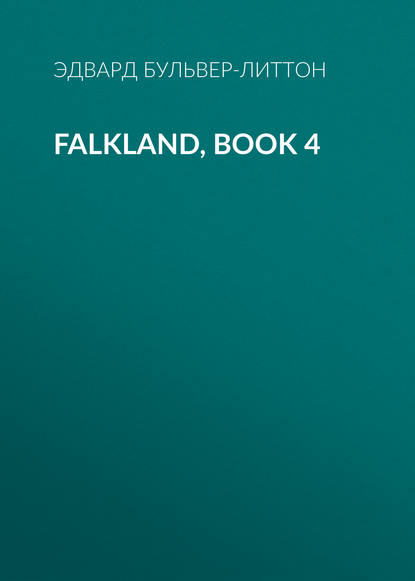 Полная версия
Полная версияFalkland, Book 4
Night came on again, with her pomp of light and shade—the night that for Falkland had no morrow. One solitary lamp burned in the chamber where he lay alone with God and his own heart. He had desired his couch to be placed by the window and requested his attendants to withdraw. The gentle and balmy air stole over him, as free and bland as if it were to breathe for him for ever; and the silver moonlight came gleaming through the lattice and played upon his wan brow, like the tenderness of a bride that sought to kiss him to repose. "In a few hours," thought he, as he lay gazing on the high stars which seemed such silent witnesses of an eternal and unfathomed mystery, "in a few hours either this feverish and wayward spirit will be at rest for ever, or it will have commenced a new career in an untried and unimaginable existence! In a very few hours I may be amongst the very heavens that I survey—a part of their own glory—a new link in a new order of beings—breathing amidst the elements of a more gorgeous world—arrayed myself in the attributes of a purer and diviner nature—a wanderer among the planets—an associate of angels—the beholder of the arcana of the great God-redeemed, regenerate, immortal, or—dust!
"There is no OEdipus to solve the enigma of life. We are—whence came we? We are not—whither do we go? All things in our existence have their object: existence has none. We live, move, beget our species, perish—and for what? We ask the past its moral; we question the gone years of the reason of our being, and from the clouds of a thousand ages there goes forth no answer. Is it merely to pant beneath this weary load; to sicken of the sun; to grow old; to drop like leaves into the grave; and to bequeath to our heirs the worn garments of toil and labour that we leave behind? Is it to sail for ever on the same sea, ploughing the ocean of time with new furrows, and feeding its billows with new wrecks, or—" and his thoughts paused blinded and bewildered.
No man, in whom the mind has not been broken by the decay of the body, has approached death in full consciousness as Falkland did that moment, and not thought intensely on the change he was about to undergo; and yet what new discoveries upon that subject has any one bequeathed us? There the wildest imaginations are driven from originality into triteness: there all minds, the frivolous and the strong, the busy and the idle, are compelled into the same path and limit of reflection. Upon that unknown and voiceless gulf of inquiry broods an eternal and impenetrable gloom; no wind breathes over it—no wave agitates its stillness: over the dead and solemn calm there is no change propitious to adventure—there goes forth no vessel of research, which is not driven, baffled and broken, again upon the shore.
The moon waxed high in her career. Midnight was gathering slowly over the earth; the beautiful, the mystic hour, blent with a thousand memories, hallowed by a thousand dreams, made tender to remembrance by the vows our youth breathed beneath its star, and solemn by the olden legends which are linked to its majesty and peace—the hour in which, men should die; the isthmus between two worlds; the climax of the past day; the verge of that which is to come; wrapping us in sleep after a weary travail, and promising us a morrow which, since the first birth of Creation has never failed. As the minutes glided on, Falkland felt himself grow gradually weaker and weaker. The pain of his wound had ceased, but a deadly sickness gathered over his heart: the room reeled before his eyes, and the damp chill mounted from his feet up—up to the breast in which the life-blood waxed dull and thick.
As the hand of the clock pointed to the half-hour after midnight the attendants who waited in the adjoining room heard a faint cry. They rushed hastily into Falkland's chamber; they found him stretched half out of the bed. His hand was raised towards the opposite wall; it dropped gradually as they approached him; and his brow, which was at first stern and bent, softened, shade by shade, into his usual serenity. But the dim film gathered fast over his eye, and the last coldness upon his limbs. He strove to raise himself as if to speak; the effort failed, and he fell motionless on his face. They stood by the bed for some moments in silence: at length they raised him. Placed against his heart was an open locket of dark hair, which one hand still pressed convulsively. They looked upon his countenance—(a single glance was sufficient)—it was hushed—proud—passionless—the seal of Death was upon it.



